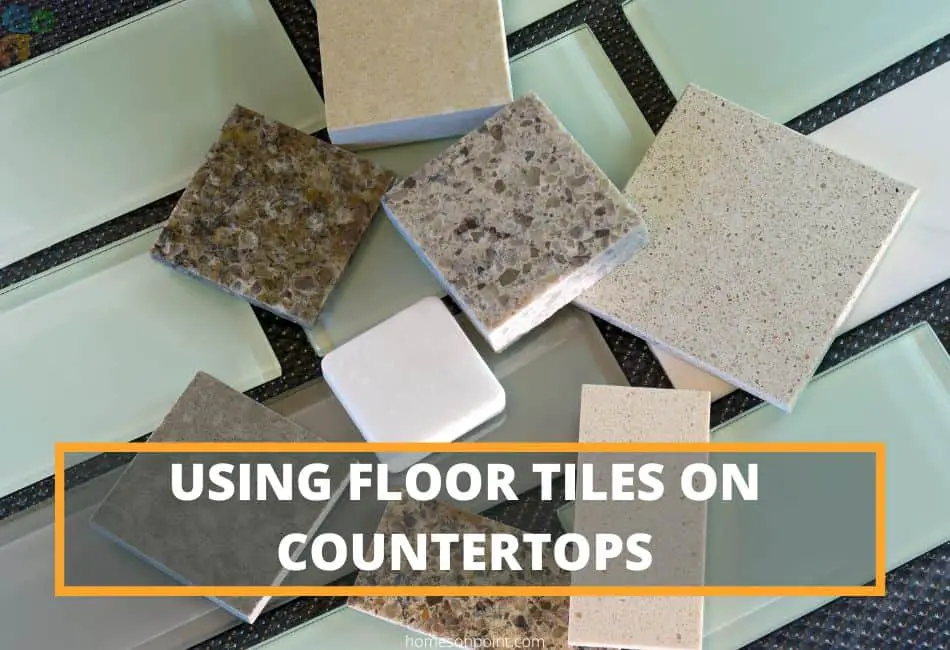Floor tiles on countertops – you’ve probably heard this before. It seems like a great idea, doesn’t it? Why not use floor tiles on countertops to create an eye-catching design in your kitchen or bathroom? There are pros and cons to using floor tiles on countertops, and in this article, we will explore both sides of the argument.
So, can you use floor tiles on countertops?
Yes, you can use floor tiles on countertops but should you use floor tiles on countertops? It is generally not recommended. Floor tiles are made to live on the floor, where they can withstand heavy foot traffic. Unlike granite or marble countertops materials, floor tiles are mostly not sealed against bacteria and spills not making them suitable for areas where food is prepared.
Tile as a countertop material is not a new concept. Tile countertops have been around for centuries, and they are still popular in many parts of the world today.
Tiles present a unique design opportunity that makes people wonder if their uniquely designed floor tiles can work as a countertop. Before you decide to fix floor tiles on the countertop, consider the pros and cons of doing so.
Pros Of Using Floor Tiles On Countertop
1. Matching Floor And Countertop Design
One of the benefits of using floor tiles on countertops is that you can create a cohesive design in your kitchen or bathroom. If you have floor tiles that you love, using them on your countertop will create a seamless look in your space.
If you like to have the same flooring and countertop materials, using floor tiles on your countertop can give you the look that you desire. You don’t need to worry about finding a countertop material that coordinates with your flooring.
2. Variety Of Colors, Patterns, And Textures
Another advantage of using floor tiles on countertops is that there is a wide variety of colors, patterns, and textures to choose from. You can find floor tiles in just about any color imaginable. If you have a specific design in mind, chances are you can find floor tiles to match.
There are also a variety of patterns and textures to choose from. You can find floor tiles that mimic the look of stone, wood, or even metal. If you want a unique look for your countertop, floor tiles are a great option.
You can also find floor tiles with a variety of finishes. You can choose from glossy, matte, or even textured finishes. This gives you the ability to create a one-of-a-kind look for your countertop. Floor tiles are an extremely versatile material.
3. Puts Extra Floor Tiles To Use
If you have extra floor tiles, using them on your countertop is a great way to put them to use. Sometimes after flooring work, you can end up with extra floor tiles. Instead of letting them go to waste, you can use them on your countertop.
This is also a great way to save money. If you were planning on buying new floor tiles for your countertop, using the ones you have can save you a lot of money.
4. Easier To Replace One Tile Than Entire Countertop
If a floor tile on your countertop gets damaged, it is much easier to replace one tile than it is to replace an entire countertop. When a section of your tiled countertop gets damaged, you don’t need to remove the entire slab. You can simply remove the damaged tile and replace it with a new one.
This is a much simpler and less expensive repair than replacing an entire countertop. The only thing you need to keep in mind is to keep extra tiles on hand in case you need to make a repair.
5. They Are Less Expensive
Floor tiles are generally less expensive than other countertop materials like quartz or granite. The average price of floor tiles is $2 to $35 per square foot. The price will depend on the type of floor tile you choose.
Cons Of Using Floor Tiles On Countertop
Even though floor tiles have many benefits, there are also some drawbacks to using them on your countertop. Here are a few things to keep in mind before you decide to tile your countertop.
1. They Are Susceptible To Stains And Bacteria
Tiles on the countertop use grout to fill in the spaces between each tile. Grout is a porous material that can absorb stains and bacteria. This means that your countertop can become stained and harbor bacteria if it is not properly sealed.
Like other countertop materials, floor-tiled countertops need to be sealed to protect them from stains and bacteria. You will need to reseal your countertop every few months to keep it looking its best.
2. They Are Tough To Clean
Floor tiles can be difficult to clean because of all the nooks and crannies. Bacteria and dirt can get trapped in the grout and be difficult to remove. If you are not careful, your floor-tiled countertop can become a breeding ground for bacteria.
You will need to be sure to scrub the grout lines to remove all the dirt and bacteria. You can use baking soda and vinegar to clean the grout lines. Be sure to rinse the area well after cleaning.
3. They Are Not The Most Durable
Floor tiles are not as durable as other countertop materials. They can crack and chip if they are not properly cared for. Especially ceramic floor tiles can crack easily if pans and heavy objects are dropped on them.
Also although they are heat resistant to a point, floor tiles can crack if they are exposed to sudden changes in temperature. This means you should avoid putting hot pans directly on your floor-tiled countertop.
If you are looking for a durable countertop material, floor tiles are not the best option. You should consider other materials like granite or quartz.
4. They Don’t Provide Smooth Even Surface
The surface of the floor tiles is not smooth and even. The grout lines can make it difficult to prep food or roll out dough. If you are looking for a countertop that provides a smooth even surface, floor tiles are not the best option.
You can try using a cutting board or pastry mat to create a flat surface on your floor-tiled countertop. Or you can look for floor tiles that have minimal grout lines.
Final Words
Floor tiles are not 100% omitted from the list of best countertop materials. For some personal reasons, one might decide to use floor tiles on his or her countertop. But if you are still undecided, we advise that you try other materials like granite or quartz. They provide a more smooth, even surface and are also more durable. Thanks for reading. We hope this article was helpful to you.
FAQs
Q: What are the recommended tiles for countertops?
A: The professional recommends porcelain and natural stone for kitchen and bathroom countertops.
Q: Can floor tiles be used on backsplashes?
A: Yes, floor tiles can be used on backsplashes. However, they need to be sealed properly to prevent staining and bacteria growth.
Q: Are floor tiles heat resistant?
A: Floor tiles are heat resistant but can crack when there is thermal shock.
Q: Can porcelain floor tile be used on countertops?
A: Yes, porcelain floor tile can be used on countertops. It is a durable and heat-resistant material. They provide a smooth, even surface and are easy to clean.
Q: Can you use vinyl flooring on countertops?
A: Yes, you can use vinyl floor tile on countertops. You first install wood like you would on the floor. After that, you lay the vinyl flooring on top of it and grout the joints.

